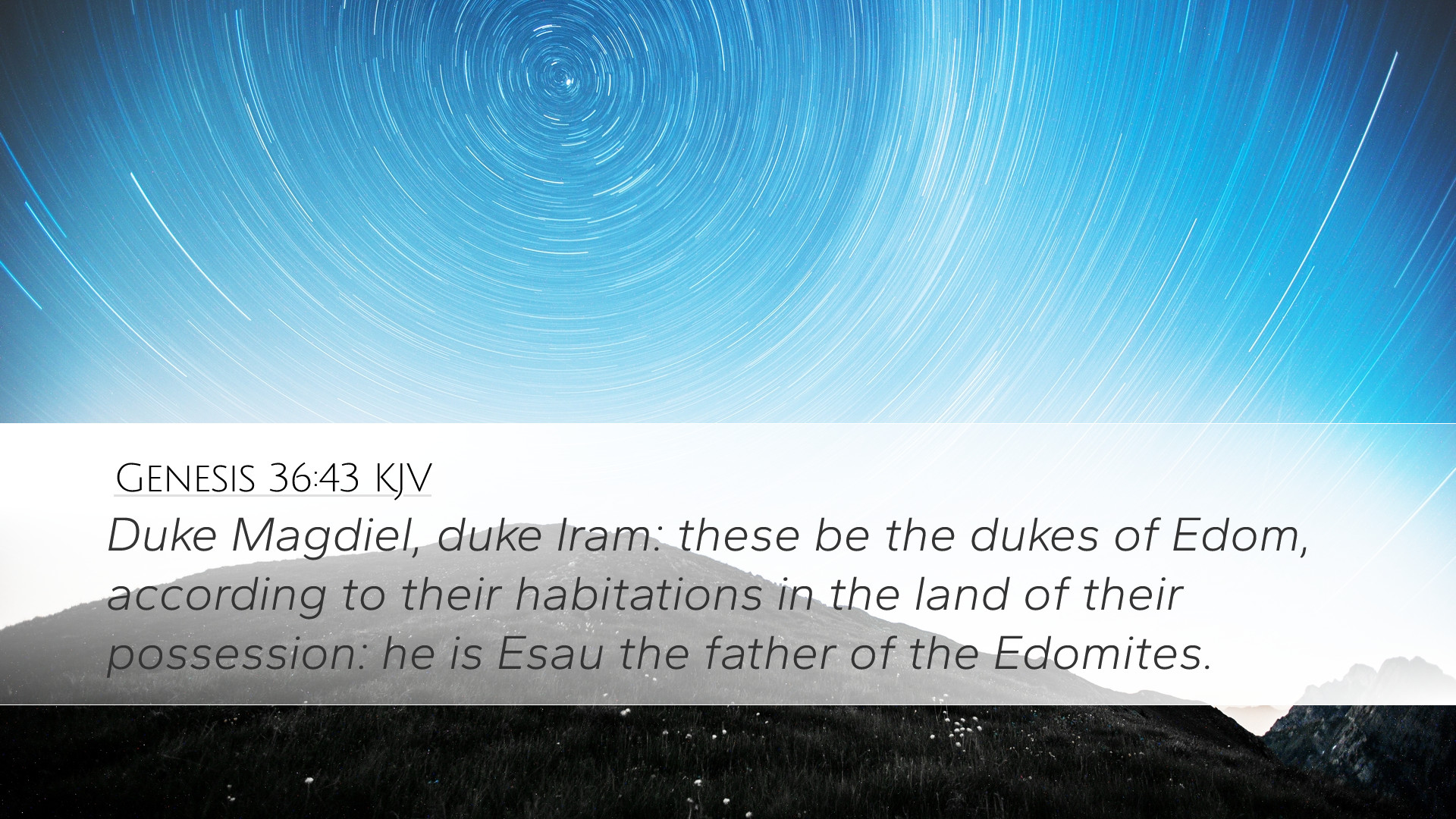Commentary on Genesis 36:43
Genesis 36:43 states: "...and the chief of the chief of the Edomites was Chief Kahath, and his sons managed the family line; Chief and family were established in their own houses." This verse serves as a significant conclusion to the genealogical account of Esau, focusing on the lineage of the Edomites. It affirms Esau's prominence and the establishment of significant tribal leadership within Edom. Below is an in-depth commentary combining insights from various public domain resources.
Context and Background
Genesis 36 details the genealogy and the kings that sprung from Esau, who is identified as the father of the Edomites. This chapter emphasizes the significance of lineage in biblical history, particularly among nations and tribes. The genealogical list not only serves a historical purpose but also reinforces God's covenantal promise through Abraham, Isaac, and Jacob, as it accounts for Esau's descendants.
Insights from Matthew Henry
Matthew Henry illuminates this passage by commenting on the importance of lineage in understanding the history of Israel's neighbors, particularly Edom. He notes that even though Esau had destinies separate from Jacob, his family line was blessed with royalty. Henry emphasizes that this serves as a reminder that God's providence extends beyond immediate descendants to encompass all nations within His divine plan.
- Leadership in Edom: Henry indicates that the leaders noted in this genealogy imply a developed societal structure in Edom, showing that they had significant chiefs leading their tribes, which speaks to their power and influence in the region.
- Significance of Names: The names mentioned hold significance, revealing characteristics and spiritual meanings that can provide insight into Edomite identity and culture.
Insights from Albert Barnes
Albert Barnes enhances the commentary on Genesis 36:43 by discussing the cultural implications of tribal leadership. He provides that the term "chief" signifies a high-ranking individual within the tribal hierarchy, which reflects an established phase of governance among the Edomites. Barnes emphasizes the role of such chiefs in maintaining order and unity among the clans of Edom.
- Development of Edomite Structure: He suggests that the organization of families and lineages portrays a thriving community, highlighting how the Edomites forged their identity separate from Israel, albeit still connected by blood through Esau.
- Historical Context: The mention of Edomite chiefs provides perspective on the historical and geopolitical context between Israel and Edom, which later plays a pivotal role during the Israelites’ exodus from Egypt and throughout the history of Israel's monarchy.
Insights from Adam Clarke
Adam Clarke's commentary approaches this passage with an emphasis on the spiritual implications of Edom's lineage. Clarke expounds that the arrangement of chief and family in Edom reflects God's sovereignty over all nations, suggesting that all tribes, including those distant from the covenant, exist within His divine plan.
- Spiritual Significance: Clarke encourages readers to consider how the Edomites, despite their separation from the chosen people, still played a role in God's overarching narrative of redemption.
- Sovereignty of God: The organization of Edom's leadership underlines the governance of God, asserting that He is aware and in control of all families and nations, which can provide comfort and hope to believers recognizing the unfolding of divine purpose in history.
Theological Reflections
This verse ultimately illustrates several theological themes pertinent to pastors, students, theologians, and Bible scholars:
- Divine Sovereignty: The mention of tribal chiefs confirms the belief that God is aware of and directs the rise and fall of nations and peoples, working even through those outside His covenant.
- Continuity and Discontinuity: Genesis 36:43 bridges the narrative of sin and redemption, where despite separation, there is a connection through lineage that speaks to God's inclusive plan for humanity.
- God's Faithfulness: The establishment of leadership among the Edomites serves as a reminder of God’s faithfulness in fulfilling His promises, not only to Israel but also to their extended family, displaying His mercy and justice.
Conclusion
Genesis 36:43 is a rich tapestry woven into the fabric of biblical history, offering insights into the tribal leadership of Edom and reinforcing God's sovereign hand over all nations. By studying this verse in conjunction with the commentaries of Henry, Barnes, and Clarke, we gain a fuller understanding of its significance both historically and theologically. This passage invites pastors, students, and scholars to reflect on the omnipresence of God’s narrative throughout history and his continued work in the lives of all humanity.


